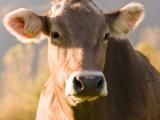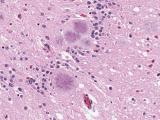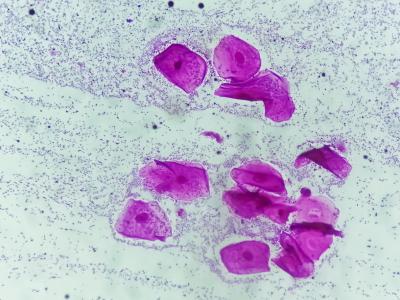May 27, 2003 (CIDRAP News) – Initial testing of more than 370 cattle from several herds in Alberta's investigation into bovine spongiform encephalopathy (BSE) detected no cases beyond the single case revealed May 20, according to Canadian agriculture officials.
Seventeen cattle herds in three provinces have been quarantined since the announcement that a cow from northwestern Alberta had tested positive for BSE, or mad cow disease. The herds under quarantine have possible links to the history of the infected cow or its offspring or to feeds made from the rendered carcass of the cow, according to Canadian officials.
"Fully 192 animals from the original herd have been slaughtered for testing, as have an additional 180 animals from other farms," the Alberta Agriculture, Food and Rural Development Department said in a statement yesterday.
The infected cow was slaughtered Jan 31 because it showed signs of pneumonia. In the course of Canada's regular BSE surveillance, tests of the animal's brain tissue this month showed that it had BSE. The rest of the carcass was sent to a rendering plant at the time of slaughter. Canadian officials have said the BSE testing was delayed because the disease was not suspected and the carcass was removed from the human food supply.
Brian Evans, chief veterinary officer with the Canadian Food Inspection Agency (CFIA), said the 17 quarantined farms include 12 in Alberta, 2 in Saskatchewan, and 3 in British Columbia. "Eleven of these farms traced back to the cow's possible movement throughout its entire life," Evans said, as quoted in the transcript of a May 25 briefing. "Three herds involved the trace-out of animals from the herd which was depopulated and tested and three farms were quarantined as a result of our investigation into the distribution of feed associated with the affected cow's movements."
Evans said DNA testing is being used in an effort to identify the birth herd of the diseased cow. "While it may not ultimately be possible to determine with absolute certainty the source herd, we will be relentless in our pursuit," he said. Evans also said all the cattle have been removed from the farm where the cow last lived and from one other quarantined farm.
Alberta officials said the three farms quarantined in connection with the tracing of feed are in British Columbia. "All of the animals from these farms are contained and have not entered the human food supply," the news release says. Canada, like the United States, in 1997 banned the use of ruminant-derived products in feeds intended for ruminants (cattle, sheep, goats, bison, elk, and deer).
A report in the Toronto Globe and Mail today said the diseased cow was rendered into chicken or hog feed. The CFIA said its own and provincial officials have visited the slaughterhouse, rendering plant, feed mills, and laboratories involved in the case to verify that BSE controls are being followed.
The US Food and Drug Administration (FDA) announced yesterday that material from the diseased cow might have ended up in dog food that may have been shipped to the United States. The suspect dog food was made by Champion Pet Food of Morinville, Alta., between Feb 4 and Mar 12, and was sold in the United States by the Pet Pantry International, Carson City, Nev., the FDA said.
The Nevada company issued a recall on two lots of dog food: "Maintenance Diet" with a use-by date of "17FEB04" and "Beef with Barley" with a use-by date of "05MAR04." People who have bought dog food from the Pet Pantry since February should check their supplies to see if any match the descriptions, the FDA said. Those who have the products are advised to contact The Pet Pantry at 1-800-381-7387 for further information on how to return the product for proper disposal. The products were sold by home delivery only.
The FDA noted that there is no evidence that dogs can contract or transmit BSE or any similar diseases.
Eating beef from BSE-infected cattle is believed to be the cause of variant Creutzfeldt-Jakob disease (vCJD), a fatal brain disease in humans. BSE emerged in British cattle herds in 1986, apparently because cattle were fed with fodder containing meat and bone meal from infected animals. More than 130 people, most of them in Britain, have died of vCJD in recent years.
See also:
CFIA's BSE update page
http://www.inspection.gc.ca/english/anima/disemala/bseesb/bseesbe.shtml


















